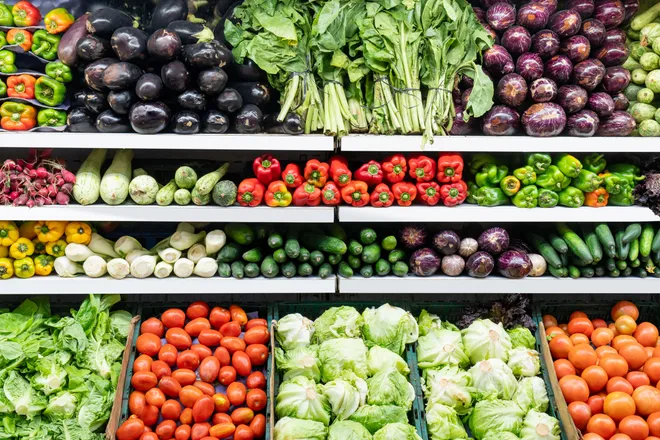Are green beans high risk? What to know about Consumer Reports' pesticide in produce study
Consumer Reports released a new study on pesticides that found certain produce contains an "unhealthy" dose of the insecticides and that green beans contained residue of pesticides that have been banned for over a decade.
The study found that some fruits and vegetables pose a higher risk than others because of the type of pesticide that was found on them.
For example, 4% of green beans tested positive for acephate or methamidophos, a breakdown product of acephate. Farmers and growers have been prohibited from using acephate on their green beans since 2011, while use of methamidophos has been completely banned since 2009.

Before the vegetable-hating kiddos in the audience start celebrating, Catherine Roberts, the in-house reporter who wrote the article for Consumer Reports, emphasized to USA TODAY that Consumer Reports is in no way saying folks should start avoiding the produce aisle all together.
"We are not nay-saying fruits and vegetables," said Roberts. "Fruits and vegetables are so good for you."
Instead, she says that eating high-risk fruits and vegetables in moderation is fine.
"We recommend a half a serving or less a day," said Roberts. "And that's still a significant amount.
The EPA released a statement that noted the agency tested nearly 30,000 produce samples and 99% of those items showed pesticide residue below the EPA's threshold.
"In setting a tolerance, EPA determines the amount of residues of the pesticide in or on food that are safe," stated Jeff Landis, the press officer of the EPA's Office of Chemical Safety and Pollution Prevention, in a statement sent to USA TODAY. "Which means that there is a 'reasonable certainty that no harm will result from aggregate exposure to the pesticide chemical residue,' which includes dietary and other nonoccupational exposures."
Consumer alert:Cal-Maine Foods, largest producer of eggs in US, finds bird flu in chickens at Texas plant
What are some high-risk fruits and vegetables?
Watermelon and green beans are both high-risk vegetables because of the pesticides that are found in them. Consumer Reports found that watermelons contained a pesticide called oxamyl.
The pesticide oxamyl is "among those that (Consumer Reports) experts believe require extra caution because of their potential for serious health risks," states the analysis.
According to Consumer Reports, examples of "very" high-risk fruit and vegetables are:
◾ Bell peppers
◾ Blueberries
◾ Imported celery
◾ Imported collard greens
◾ Potatoes
Can you wash out pesticides?
The answer is no.
The produce that was tested, according to Roberts, was washed before it was evaluated.
The pesticides can either be "taken up in the roots of the plant, or they can be absorbed below the skin," said Roberts. So while washing produce before consuming it is "an important step," it won't reduce the risk of possibly consuming pesticides.
Regardless, Roberts still recommended washing produce for 10 to 15 seconds in cold water before eating it.
Who's most at risk from pesticides?
Despite residues being found in small amounts of produce, they can still pose huge risks to the people who consume them, especially children or people who are pregnant, Roberts said.
She said that not only are some of these pesticides endocrine disrupters, meaning they can affect hormones in one's body, but Roberts said that people whose diets have higher amounts of pesticides could potentially have a higher risk of getting cancer or cardiovascular disease.
While the pesticide levels in some of the tested produce may be within EPA limits, Roberts said that could be an indication that the EPA's thresholds are too high.
Landis said the EPA stands by its comprehensive pesticide assessment and review.
"EPA’s human health risk assessments consider all relevant scientific data on the pesticide and are based on the overall risk of a pesticide taking into consideration comprehensive hazard, dose-response, and exposure assessments," stated Landis.
But the threat extends beyond consumers, Roberts said: Farmers, their families and other agricultural workers who handle the produce are also at a higher risk from contamination.
According to a study published by the National Library of Medicine, agricultural workers are more likely to be susceptible to illnesses related to their exposure to toxic chemicals and pesticides. The chemicals they're exposed to daily can negatively affect their physical and neurological health.
How to reduce exposure to pesticides as a consumer
Roberts recommended folks buy organic produce when possible.
The data Consumer Reports collected showed that pesticide-related risk was much lower in organic food than in non-organic food.

This is because the United States Department of Agriculture only allows pesticides that are approved by the National Organic Program to be used on organic produce, said Roberts.
"It's not that organic food has no pesticides," stated Roberts. "(The) ones that it does (have) are considered lower risk."
Roberts said that Consumer Reports is asking the EPA to ban organophosphates and carbamates, the pesticides that are the biggest drivers of risk in the organization's analysis.
"These pesticides need to not be used," she stated. "There's no need for it. Organic growers do it without them all the time."
If the EPA proceeded with Consumer Reports' request, it would not be the first time it banned a pesticide from being used.
In the statement, Landis said that since EPA started the pesticide registration review program in 2006, it "canceled some or all uses in nearly 25% of the conventional pesticide cases it has completed work on" when new science points to the need for "additional mitigations"
Julia is a trending reporter for USA TODAY. She has covered various topics, from local businesses and government in her hometown, Miami, to tech and pop culture. You can follow her on X, formerly known as Twitter, Instagram and TikTok: @juliamariegz
Disclaimer: The copyright of this article belongs to the original author. Reposting this article is solely for the purpose of information dissemination and does not constitute any investment advice. If there is any infringement, please contact us immediately. We will make corrections or deletions as necessary. Thank you.





